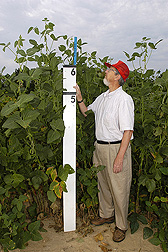This page has been archived and is being provided for reference purposes only. The page is no longer being updated, and therefore, links on the page may be invalid.
Read the magazine story to find out more. |
|
Breeding Soybeans for Ethanol and Fiberboard
By Don ComisNovember 22, 2006
Having successfully turned pieces of giant soybean stalks into charcoal briquettes, Agricultural Research Service chemical engineer Justin Barone now believes they would make good fiberboard and other wood-substitute products as well. ARS geneticist Thomas E. Devine took the plants to Barone after noticing they had a rare ability to stand up straight all season, despite their unusual height of up to 7 feet. Soybean plants often lodge—fall down—as they grow taller.
Barone is with the ARS Environmental Management and Byproduct Utilization Laboratory, and Devine is with the ARS Sustainable Agricultural Systems Laboratory, both in Beltsville, Md.
Devine suspected one reason the experimental line of soybeans stood so straight all season was because the cellulose fibers in their sapling-like stalks were unusually strong.
Barone's heat-measurement test supports this: A piece of the stalk takes as long to heat up as a sturdy 2x4 pine board.
Barone hopes to design a test that plant breeders can use to determine the strength or weakness of a plant's cellulose. Plants could be specially bred with strong cellulose, for use in briquettes and wood substitutes, or with weak cellulose better suited for cellulosic ethanol production.
Finding new microbial enzymes to break down tough cellulose is a major obstacle to producing cellulosic ethanol from plants such as soybeans or corn. Giving breeders a test for weak cellulose would allow them to select plants with cellulose that could be easily converted to ethanol by existing enzymes. Devine and agronomist James McMurtrey (recently retired from ARS) found evidence for this two years ago, in a study showing that naturally occurring soil microbes degraded some soybean stalks more rapidly than others.
Soybeans have an advantage over corn and other crops because they don't need commercial nitrogen fertilizer. This helps ensure that producing ethanol or other products from soybeans uses less energy.
For more details, see the November-December 2006 issue of Agricultural Research magazine.
ARS is the U.S. Department of Agriculture’s chief scientific research agency.

